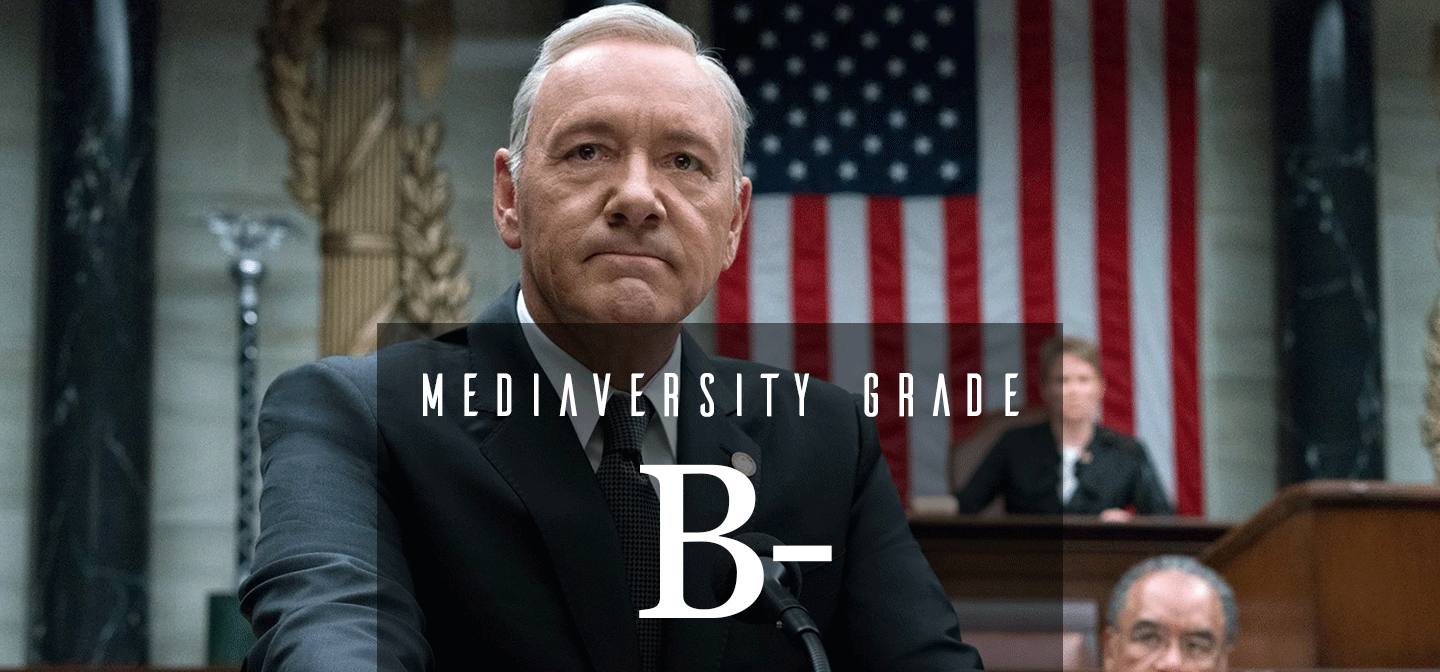House of Cards - Seasons 1-5
“There is definitely something radical about seeing a bisexual president of the United States, although he is closeted during his time in office.”
Title: House of Cards
Episodes Reviewed: Seasons 1-5
Creator: Beau Willimon 👨🏼🇺🇸
Directors: James Folley 👨🏼🇺🇸 (12 eps), Robin Wright 👩🏼🇺🇸 (9 eps), and various (14 ♂ and 4 ♀)
Writers: Andrew Davies 👨🏼🇬🇧 (65 eps), Michael Dobbs 👨🏼🇬🇧 (65 eps), and various (11 ♂ and 5 ♀)
Reviewed by Mimi 👩🏻🇺🇸
Technical: 4/5
Critics frequently cite House of Cards in discussions about the current era of “prestige drama.” But as the series has fallen out of favor, some question if the show truly deserves the mantle. The buzz surrounding Season 1 can easily be attributed to the political climate in which this remake of a British drama first debuted in America. In the real world, our then-president had campaigned and won (twice!) on a message of hope and idealism, only to have his ambitious agenda repeatedly thwarted by congressional obstructionism. Witnessing the wily doggedness of a make-believe politician like Francis “Frank” Underwood (Kevin Spacey) felt like much-needed salve.
Over the years, Francis moved on from his Washington-insider wheelings and dealings, to geopolitical games with China and Russia, and back again to the stateside circus of a U.S. presidential election. As the bodies piled up, the increasingly improbable storylines tested the audience’s ability to suspend our disbelief. The once dark thrills have since given way to pure sensationalism that no longer feels timely nor relevant, merely exhausting.
Gender: 3.5/5
Does it pass the Bechdel Test? YES
Underwood’s Machiavellian quest for power receives no small amount of assistance from his wife and literal partner in crime, Claire Underwood (Robin Wright)—a fantasy of Hillary Clinton as Lady Macbeth come to life. A lesser actress might have succumbed to playing Claire as a predictable female villain, yet Robin Wright manages to transform the role into a magnificent psychological study of an anti-heroine. Emerging as Francis’ intellectual equal and, therefore, his greatest match, Wright’s character has grown from what first appeared to be a supporting role to a rival protagonist.
In the latter seasons, Claire has been rewarded with some equally intriguing scene partners in her mother (Ellen Burstyn), Leann Harvey (Neve Campbell), and Jane Davis (Patricia Clarkson). The majority of women orbiting the Underwoods’ world tend to slip into the femme fatale category, however, with their sexuality often contributing to their inevitable demise: Zoe Barnes (Kate Mara), Rachel Posner (Rachel Brosnahan), and, I would argue, Jacky Sharp (Molly Parker) all fall under this umbrella. The rest, such as Catherine Durant (Jayne Atkinson) and Heather Dunbar (Elizabeth Marvel), function primarily as political pawns. Not to say that these women are not as complex or interesting as their male counterparts, but I do find the storytelling reliant upon the male gaze. So while the show may be an equal opportunity offender in its portrayal of women, who are just as conniving and power-hungry as the men, the writing isn’t nearly sophisticated enough to truly subvert gender norms.
Race: 2.5/5
House of Cards gave us one of the richer characters in Remy Danton, which ultimately served as the vehicle for Mahershala Ali’s meteoric rise. Unfortunately, with his exit from the series, the cast remains blindingly white. Other familiar faces of color from the early seasons include small business owner Freddy (Reg E. Cathey) and President Walker’s chief of staff Linda Vasquez (Sakina Jaffrey, who is a South Asian American actress playing a Latina character). Xander Feng (Terry Chen) briefly appeared as a cosmopolitan Chinese businessman in Season 2. Minority Whip and leader of the Black Caucus Terry Womack (Curtiss Cook), as well as journalists Sean Jeffries (Korey Jackson) and Angela (Alexis Nichole Smith) also lend some color to the show. But considering that Washington D.C. is a majority Black city (49% Black, 43.6% white, 5.0% other, and 3.1% Asian in 2014), the dearth of Black characters is glaring. Although, one could argue that the whiteness roughly reflects that of Congress and the current administration.
LGBTQ: 4/5
While Francis undoubtedly respects and pledges his loyalty above everyone else to Claire, his chosen partner, he seems to reserve his romantic love for men. There is definitely something radical about seeing a bisexual president of the United States, although he is closeted during his time in office. As the series progresses, his sexuality continues to be threaded into the plot, often becoming integral to his character’s motivations. In many respects, his affections for his old college friend Tim Corbet (David Andrews) and his secret service agent Meechum (Nathan Darrow) offer the few glimmers we get of his humanity and his capacity for tenderness.
At the same time, the revelation of Francis’ bisexuality feels intentionally titillating, as yet another means of drawing attention to his unconventional marriage. While the Underwoods have agreed to an open relationship, the fact that it remains a secret from the public, and therefore a threat to their political careers if divulged, reinforces Francis’ relationships with men as taboo. It also plays on the stereotype that bisexual people are naturally promiscuous, as well as duplicitous. And that his lovers end up dead or otherwise dismissed is telling of the the show’s ambivalent treatment of characters who aren’t cisgendered or heteronormative.
Mediaversity Grade: B- 3.50/5
House of Cards’ effort towards inclusive representation, which could be described as spotty at best, parallels the highs and lows of the series itself. After five seasons, the narrative strayed further and further from political reality, and into the realm of “what would happen if conspiracy theories were real?” I’m not convinced the show has much gas left in the tank, but it was certainly a wild ride while it lasted.

